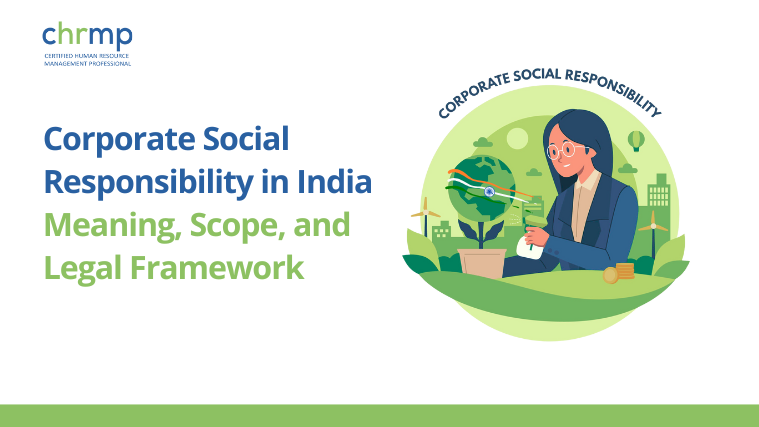

As an HR professional, have you ever wondered how your organization can balance profit with purpose? In today’s competitive business environment, companies are no longer just judged by their bottom line. Instead, their commitment to Corporate Social Responsibility (CSR) plays a vital role in defining their reputation. This shift in focus towards CSR isn’t just a passing trend; it is now an essential part of business strategy. But how exactly does CSR shape the success of organizations in India?
In this blog, we’ll explore how CSR is shaping the future of businesses, the evolving legal landscape, and how HR professionals can lead the charge in embedding CSR into company culture and operations.

Corporate Social Responsibility (CSR) isn’t just a buzzword anymore—it’s a strategic approach that businesses use to ensure they’re giving back to society while also achieving long-term success. To better understand how CSR works in practice, two concepts are key: Archie Carroll’s Pyramid of CSR and the Triple Bottom Line (TBL).
Carroll’s Pyramid of CSR is a helpful way to break down CSR responsibilities into layers. At the base, companies must first meet their economic responsibilities—this means staying profitable and competitive. Next, they need to comply with legal responsibilities by following the laws in place. Moving up, ethical responsibilities come into play, urging businesses to go beyond the law and do what’s right for society. At the top, philanthropic responsibilities focus on voluntary actions, like donations and community projects, that aim to improve societal welfare.
On the other hand, the Triple Bottom Line (TBL) takes a broader approach, focusing on three key areas: People, Planet, and Profit. TBL stresses that businesses should balance social impact (People), environmental sustainability (Planet), and financial success (Profit). This holistic view encourages companies to not only maximize profits but also contribute positively to society and the environment.
Together, these concepts show how CSR is about creating sustainable practices that drive business success, while benefiting communities, improving social welfare, and promoting environmental responsibility.
Corporate Social Responsibility (CSR) in India is far more than just philanthropy; it has become a strategic business tool that businesses use to align their operations with societal expectations. CSR is about businesses acting ethically, improving sustainability, and fostering community welfare. In the Indian context, CSR goes beyond charitable donations; it is now seen as an integral part of a company’s overall business strategy that contributes to the social and environmental well-being of communities.
To better understand how CSR translates into action, let’s look at some prominent examples of Indian companies that are integrating CSR into their business strategies. These examples not only highlight the diverse ways businesses can fulfill their ethical obligations but also illustrate how CSR initiatives directly contribute to both community welfare and business sustainability.
For example, Tata Chemicals focuses on CSR through its commitment to rural development. The company collaborates with farmers to improve agricultural productivity by providing training in livestock management and organic farming. Additionally, Tata Chemicals runs CSR initiatives like skill development programs in fashion technology and welding, helping rural youth gain employment opportunities.
Hindalco invests in CSR through initiatives in healthcare and education. The company conducts medical camps, provides ambulance services, and supports health centers that focus on diseases like malaria and tuberculosis. Hindalco also promotes primary schooling, adult literacy, and offers scholarships for girls, all part of their CSR efforts to improve access to education and healthcare.
ITC Limited demonstrates its commitment to CSR by educating over 250,000 children through supplementary learning centers. It also empowers 15,000 women through self-help groups as part of its CSR focus on women’s empowerment and sustainable community development. ITC’s CSR initiatives aim to improve livelihoods and promote social inclusion in the communities where it operates.
These examples showcase that businesses are increasingly recognizing that CSR can drive long-term business success. It is no longer merely about giving back to society, but about ethical operations, ensuring sustainable business practices, and creating an environment that benefits both the organization and the community.
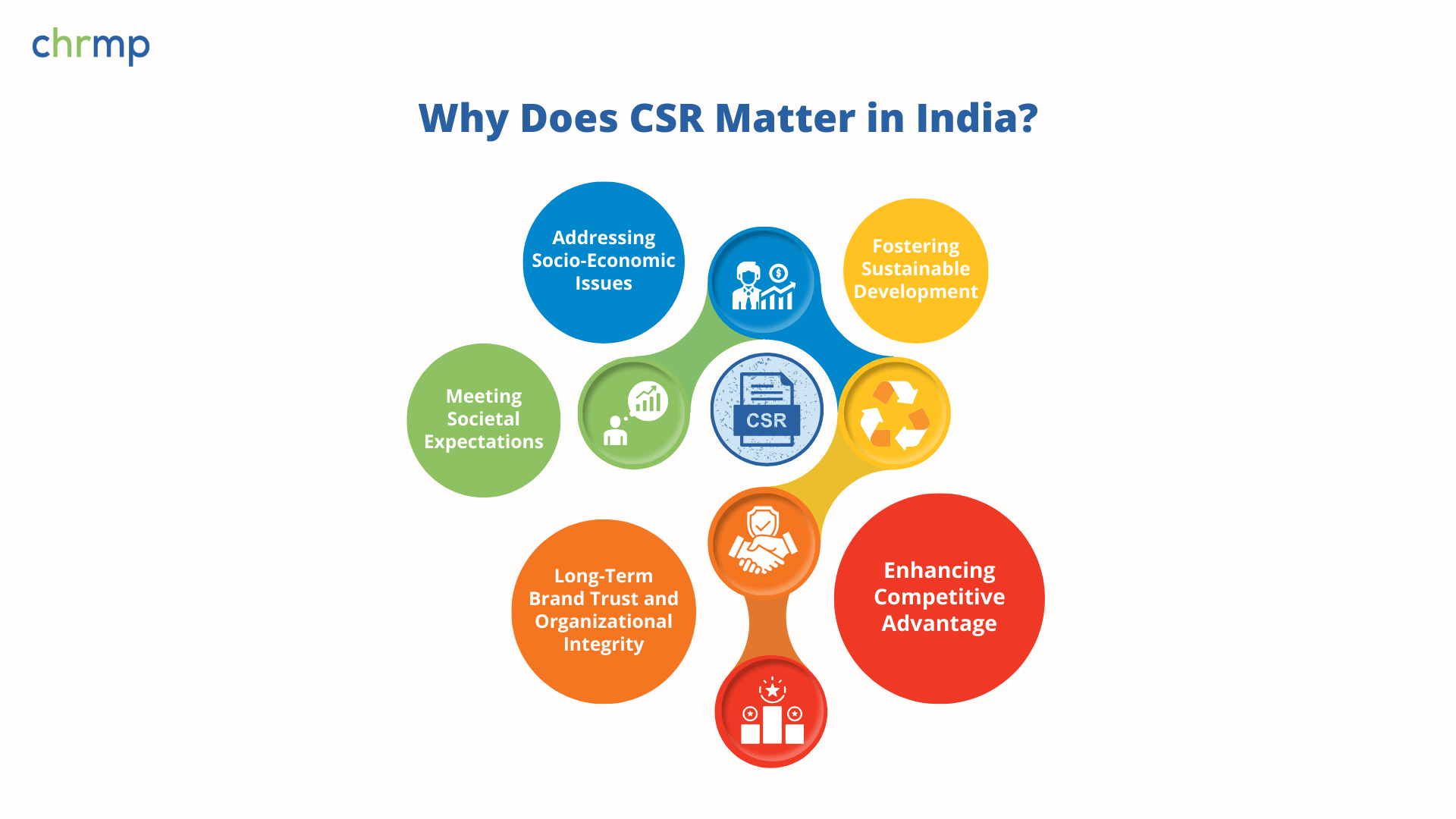
Corporate Social Responsibility (CSR) in India plays a critical role in addressing the country’s pressing socio-economic issues, while also helping businesses align with the expectations of society. Below are the key reasons why CSR is crucial for businesses in India:
India faces significant challenges like poverty, lack of education, and environmental degradation. CSR enables businesses to contribute to solving these issues, thereby creating social value alongside economic growth.
As societal expectations evolve, businesses are expected to play an active role in improving the well-being of communities and promoting sustainability. CSR allows companies to meet these expectations by aligning their operations with the needs of society.
CSR initiatives help businesses build brand trust by demonstrating a commitment to ethical practices and sustainability. This fosters long-term integrity and makes companies more attractive to consumers, employees, and investors.
By integrating sustainable practices into their operations, businesses can help achieve long-term growth while contributing to environmental and societal well-being, ensuring sustainability for future generations.
A strong CSR program can give companies a competitive edge by attracting loyal customers and talented employees who value corporate responsibility and sustainability.
Historically, CSR in India was viewed primarily as charity or religious giving, often involving donations or acts of kindness driven by individuals or religious institutions.
For example, Tata Group has long been known for their philanthropic efforts, such as donating to education and healthcare initiatives from the early 20th century. These contributions were typically voluntary and did not necessarily align with long-term business strategies. CSR in this period was seen as an optional, goodwill-driven activity rather than a key business tool.
However, as India’s business landscape evolved, so did the approach to CSR. The rapid industrialization and globalization of the 1990s, alongside growing concerns about environmental sustainability and social inequalities, pushed businesses to rethink their roles in society.
Today, CSR is recognized as a strategic business tool that helps companies engage with communities, improve their reputation, and achieve long-term growth.
The biggest shift in CSR came in 2013 with the introduction of the Companies Act, 2013. India became the first country to mandate CSR, requiring companies meeting certain financial thresholds to allocate at least 2% of their average net profits over the previous three years to CSR activities. This legislation marked a pivotal transition of CSR from being a voluntary effort to a legally required aspect of business strategy and governance.
In the financial year 2023-2024, a total of 24,392 companies in India contributed to CSR efforts, funding 51,966 projects across 14 development sectors. These initiatives amounted to an investment of approximately Rs. 29,987 crore, with a focus on key areas such as education, environment, healthcare, and women’s empowerment.
This data on CSR expenditure underscores how CSR, now firmly embedded in business strategy and governance, continues to drive meaningful contributions toward societal development.
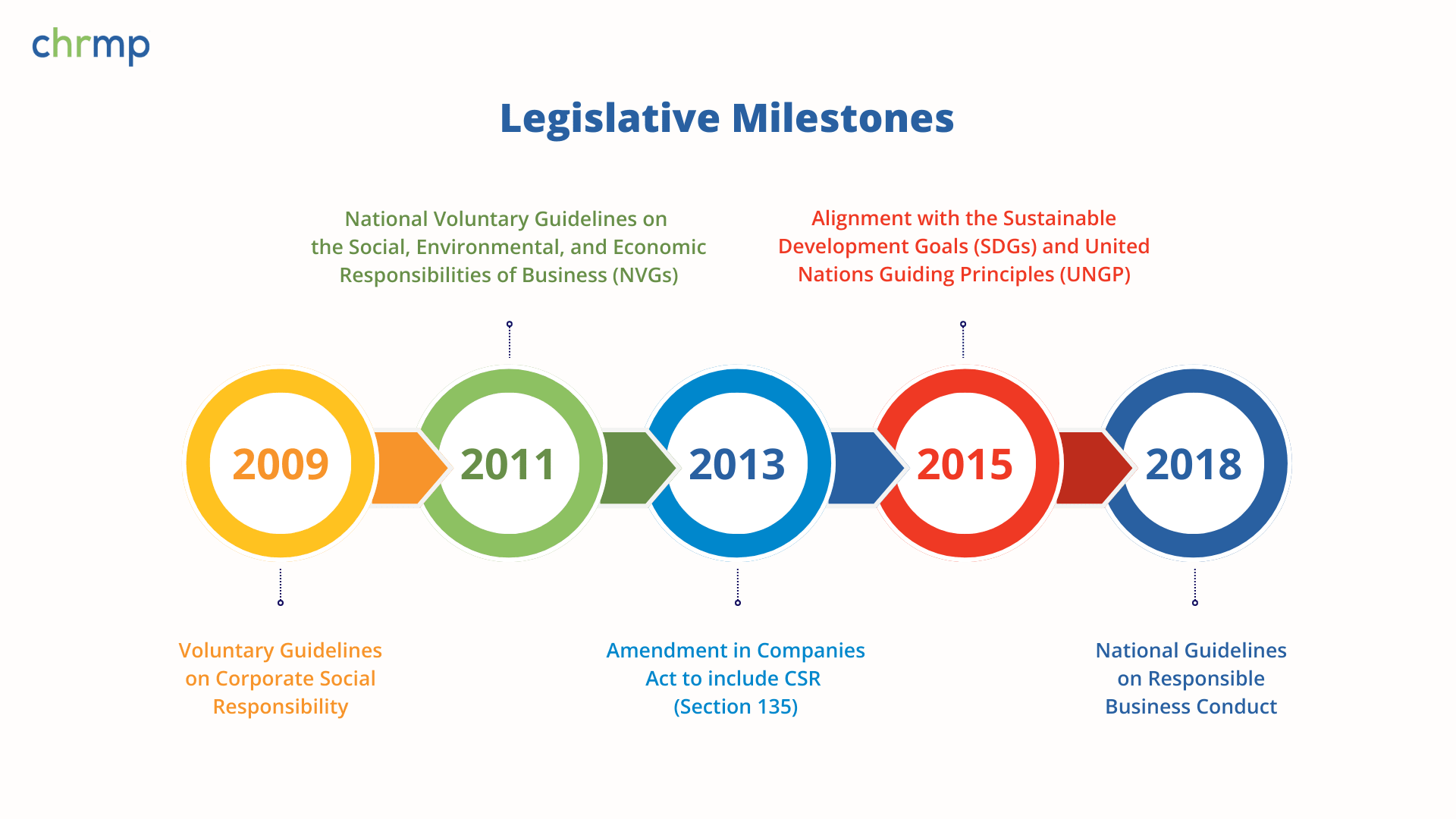
In 2009, the Ministry of Corporate Affairs (MCA) introduced the Voluntary Guidelines on Corporate Social Responsibility. These guidelines were the first step in encouraging businesses in India to voluntarily integrate ethical operations, environmental sustainability, and social welfare into their business practices. Although not legally binding, the guidelines aimed to promote corporate governance and encourage companies to take responsibility for their societal impact. The guidelines laid the groundwork for the later shift toward mandatory CSR compliance.
Building on the success of the Voluntary Guidelines, in 2011, the National Voluntary Guidelines (NVGs) were introduced. These guidelines were more comprehensive and structured, focusing on nine thematic pillars of business responsibility. While still voluntary, these guidelines set the stage for the future legal mandates of CSR, particularly in aligning business operations with social, environmental, and governance (ESG) principles.
In 2013, the Companies Act, 2013 marked a historic change in CSR practices in India by legally mandating CSR. This Act made India the first country in the world to introduce mandatory CSR for businesses. Under Section 135, companies meeting certain financial thresholds were required to allocate at least 2% of their average net profits from the last three years toward CSR activities.
This was a groundbreaking move that not only made CSR a legal obligation but also integrated it into corporate governance. The amendment established a CSR committee within companies, which became responsible for ensuring the strategic alignment of CSR activities with business goals and regulatory compliance.
In 2015, the MCA began the process of revising the NVGs to align them more closely with the Sustainable Development Goals (SDGs) and the United Nations Guiding Principles on Business and Human Rights (UNGP). This revision was initiated to ensure that businesses in India could contribute more directly to global sustainability efforts and human rights while continuing to build ethical and responsible business models.
In 2018, the National Guidelines on Responsible Business Conduct were introduced as an update to the previous guidelines. These guidelines further enhanced the ethical conduct, sustainability, and transparency expected of businesses in India. They expanded on the previous frameworks to encourage companies to adopt a holistic approach to their social and environmental responsibilities.
The 2018 guidelines emphasized corporate accountability, the need for impact assessment, and the integration of CSR with long-term business strategy. They also aligned with global standards, urging Indian businesses to think beyond compliance and focus on contributing positively to society.
Section 135 of the Companies Act, 2013 and the CSR Rules that were framed thereunder provide the legal framework for Corporate Social Responsibility (CSR) in India.
Section 135 of the Companies Act, 2013 mandates that certain companies in India are required to spend a specified percentage of their profits on Corporate Social Responsibility (CSR) activities. The criteria for applicability are based on the company’s financial performance over the previous three years.
Companies meeting any of the following thresholds must adhere to CSR requirements:
If a company meets any of these criteria, it is required to comply with CSR regulations, regardless of whether it is classified as a “large” or “small” company.
It is also interesting to note that Rule 3(1) of the CSR Rules extends CSR provisions not only to holding and subsidiary companies but also to foreign companies operating in India, as long as they meet the required applicability threshold.
With this mandate, CSR went from being a voluntary activity to an essential business function that requires proper documentation, transparency, and regular compliance.
According to Section 135(5) of the Companies Act, 2013, businesses that meet the financial eligibility criteria are required to spend at least 2% of their average net profits from the last three years on CSR activities.
Rule 2 goes further to clarify what counts as CSR expenditure. It covers all costs directly related to CSR projects that have been approved by the board but excludes non-CSR activities. However, there’s a caveat: administrative overheads related to building CSR capacity can be included, but only if they stay within 5% of the total CSR budget for the year.
This structure ensures that companies remain focused on impactful initiatives while still maintaining transparency and accountability in how they allocate their CSR funds.
If a company is unable to spend the allocated CSR funds in a given year, Section 135(5) of the Companies Act, 2013 mandates that the reasons for the unspent amount must be clearly stated in the Board’s Report.
From January 22, 2021, the Companies (Amendment) Act, 2019 and 2020 introduced changes that require any unspent CSR funds to be transferred to one of the funds listed in Schedule VII within six months of the financial year’s end. However, this applies only if the company hasn’t approved any ongoing multi-year CSR projects. This ensures that unspent CSR amounts continue to contribute to community welfare and sustainable development in a timely and responsible manner.
Starting from January 22, 2021, a key amendment in Section 135(5) of the Companies Act, 2013 now allows companies to carry forward any excess CSR spending to offset future CSR obligations. So, if a company spends more than the required 2% of its net profits, it can use the extra funds to meet CSR requirements for up to the next three years.
However, as per Rule 7(3) of the CSR Rules, the excess CSR spending, must not include any surplus (leftover or unspent funds from CSR activities that were allocated for a specific project but were not fully used)and can only be set off if the Board passes a resolution approving it.
This change is great news for companies who exceed their CSR targets, as it allows them to make a greater impact without worrying about penalties, while also promoting consistent and sustained contributions toward community welfare.
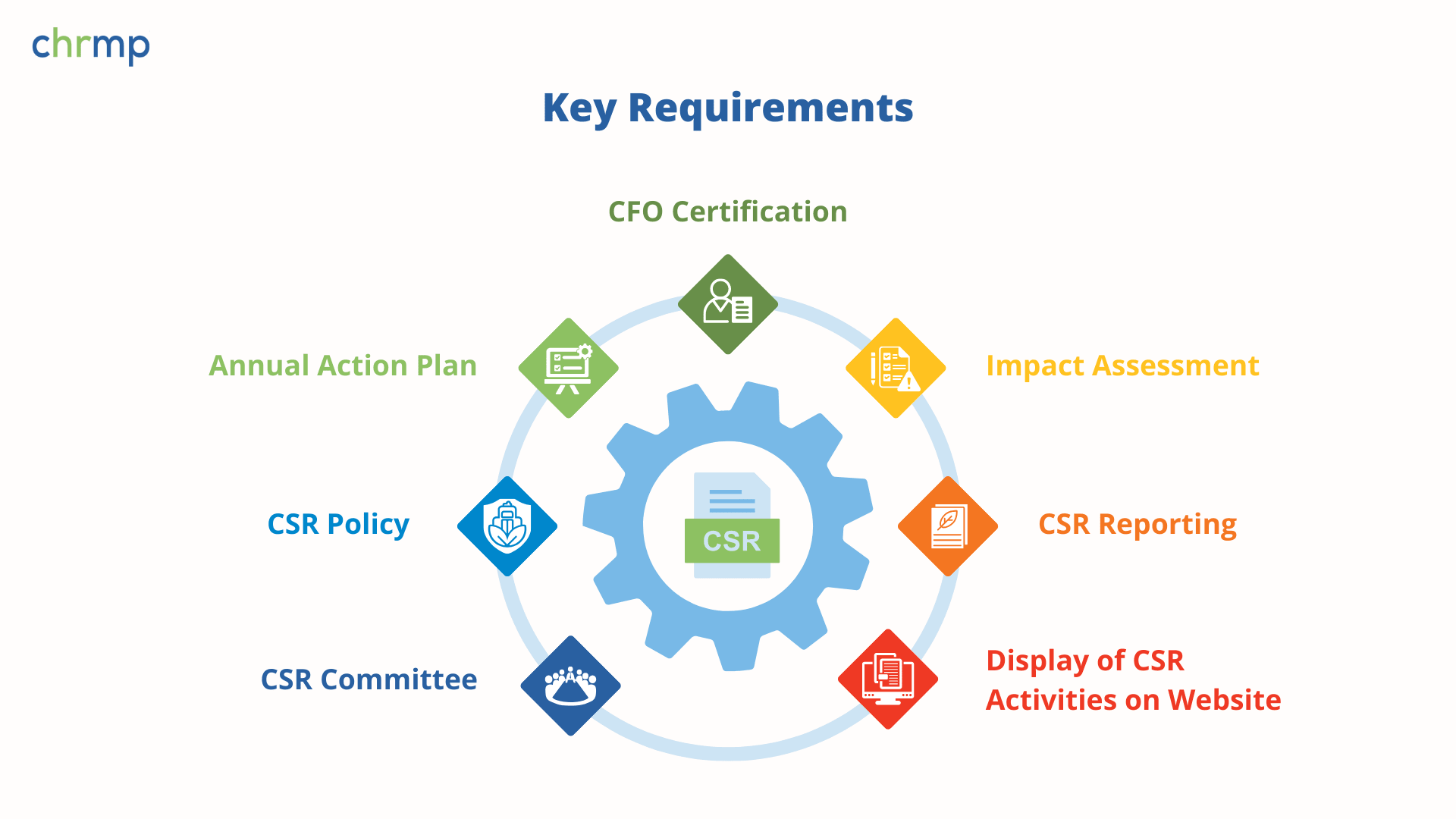
As per Section 135(1) of the Companies Act, 2013, companies meeting the applicability criteria must form a CSR Committee consisting of board members, including at least one independent director. This committee is responsible for formulating and overseeing the CSR policy, ensuring that the company’s CSR activities align with legal requirements.
According to Section 135(3) of the Companies Act, 2013, the company must have a CSR policy in place, outlining the initiatives, focus areas, and specific goals of the company’s CSR activities. This policy must be approved by the board and communicated to stakeholders.
As per Rule 5(2) of the CSR Rules, the CSR Committee must formulate and recommend to the Board an annual action plan, including approved CSR projects, execution methods, fund utilization, monitoring mechanisms, and impact assessment details.
As per Rule 4(5) of the CSR Rules, the Chief Financial Officer (CFO), or the individual responsible for financial management, must provide a certification to the Board confirming that the CSR funds disbursed have been utilized in accordance with the purposes and manner approved by the Board.
Impact Assessment :
According to Rule 8(3)(a) of the CSR Rules, companies with a CSR obligation of Rs. 10 crore or more must conduct an impact assessment for projects exceeding Rs. 1 crore and completed at least one year prior. Rule 8(3)(b) requires the impact assessment report to be presented to the Board and annexed to the annual CSR report.
According to the CSR Rules, the Board’s Report must include an annual CSR report following the format in Annexure I (for financial years prior to April 1, 2020) or Annexure II (for financial years from April 1, 2020 onwards). Foreign companies must also include this report in their balance sheet.
As per Rule 9 of the CSR Rules, companies must disclose the CSR Committee composition, CSR Policy, and approved projects on their website for public access. The amendment on 22nd January 2021 expanded the requirements, including the disclosure of the CSR Committee’s composition alongside the CSR Policy.

Schedule VII of the Companies Act, 2013 defines the permitted activities eligible for CSR funding.
By defining the permitted activities, Schedule VII ensures that CSR efforts contribute to community welfare, environmental sustainability, gender equality, and inclusive growth, aligning corporate actions with the broader goals of national progress and social responsibility.
Below are the key categories of activities that companies can invest in through CSR initiatives:
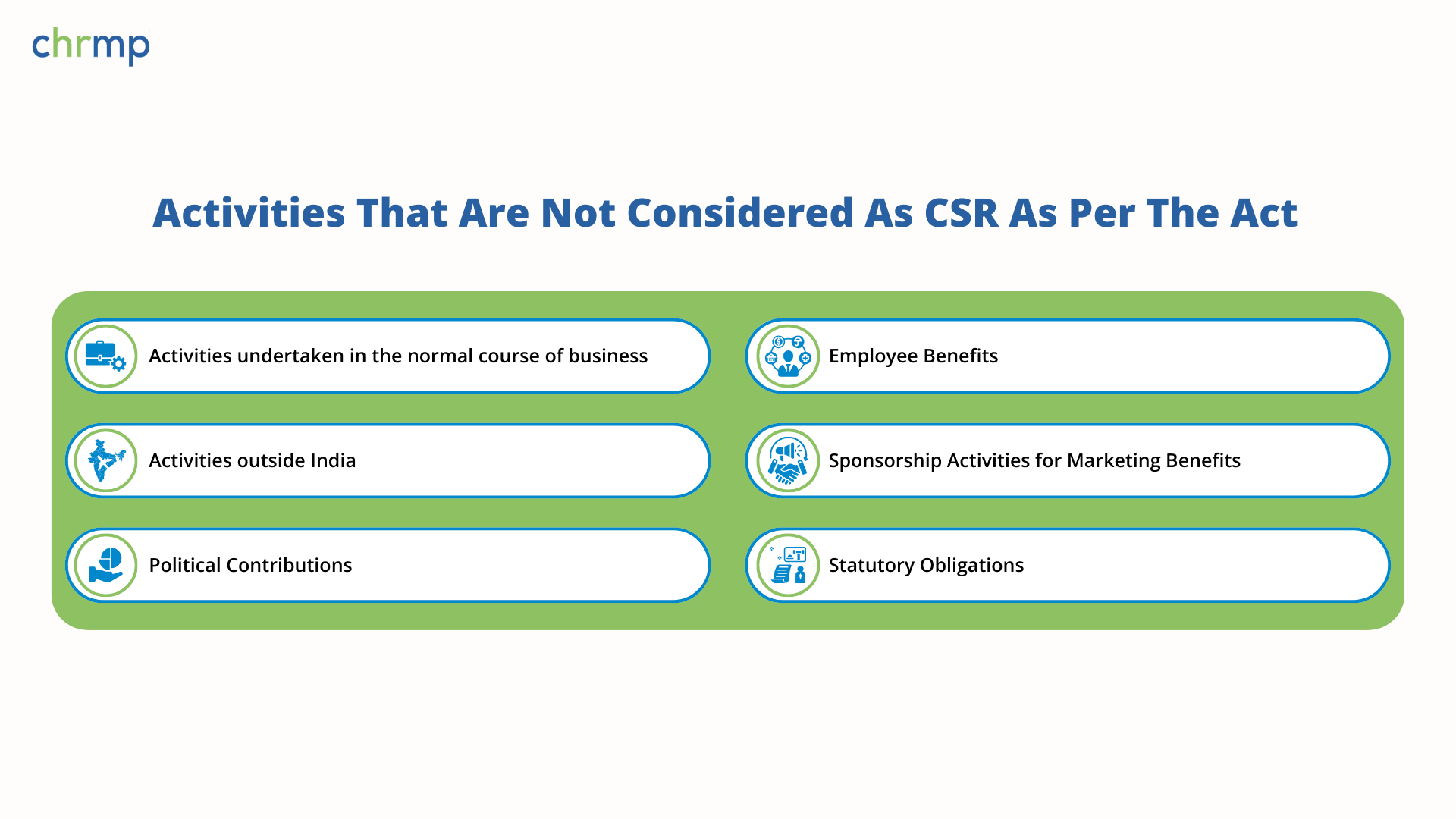
Rule 2(d) of the CSR Rules clearly outlines activities that will not be considered as part of a company’s CSR initiatives.
This rule ensures that CSR spending is directed toward community welfare, sustainable development, and social impact, and not for purposes that are part of normal business or personal gain.
These are:
Any activity that is part of the company’s core business operations and not a separate CSR initiative is excluded from CSR spending.
CSR does not include activities undertaken outside India, except for the training of Indian sports personnel representing a State, Union territory, or India at the national or international level.
Any contribution, whether directly or indirectly, to any political party as per Section 182 of the Companies Act, 2013, is not considered CSR.
Activities that primarily benefit employees of the company, as defined under Clause (k) of Section 2 of the Code on Wages, 2019, are excluded from CSR, as they do not contribute to community welfare.
Sponsorship of events or activities that primarily serve to derive marketing benefits for the company’s products or services do not qualify as CSR.
Activities carried out solely to fulfil statutory obligations under any law, including environmental regulations or other legal requirements, are not considered part of CSR, as these are legally mandated duties.

Ensuring compliance and maintaining accurate documentation are essential aspects of effective CSR governance. The CSR Rules mandate specific reporting and registration requirements to guarantee transparency and accountability in CSR activities. These requirements include:
Rule 4(2) of the CSR Rules mandates that implementing agencies register with the Central Government by filing CSR-1 electronically, effective from April 1, 2021. These agencies, which undertake CSR activities on behalf of companies, include entities such as Section 8 companies, registered trusts or societies under Section 12A and 80G of the Income Tax Act, or those with at least three years of experience in similar activities .
This filing ensures that companies only work with registered and compliant agencies that align with the company’s CSR policy and objectives.
CSR-2 is an annual reporting format introduced by the Ministry of Corporate Affairs (MCA) through a Notification dated February 11, 2022. It requires companies to file a CSR report electronically, detailing their CSR spending, projects undertaken, and the impact of these activities.
This format ensures that companies remain transparent about their CSR efforts and provides stakeholders with clear and concise information regarding the company’s contribution to societal welfare and sustainable development.
The Companies (Amendment) Act, 2020 amended Section 135(7) of the Companies Act, 2013, effective from January 22, 2021, to introduce stricter penalties for non-compliance with CSR provisions.
Now if a company fails to transfer the required funds to the Schedule VII Fund or Unspent CSR Account as per Section 135(5) or 135(6), it will be liable to a penalty of twice the amount required to be transferred, or up to one crore rupees, whichever is lower. Additionally, any officer in default will face a penalty of one-tenth of the required amount, or two lakh rupees, whichever is lower.
India’s corporate landscape is increasingly recognizing the power of giving back, with several giants leading the charge in Corporate Social Responsibility (CSR). Let’s take a quick look at how some of the nation’s top players are making a tangible impact:
The role of Corporate Social Responsibility (CSR) is rapidly evolving, moving beyond traditional philanthropy to become a crucial element in how businesses are evaluated and how they contribute to a better world.
As global focus intensifies on Environmental, Social, and Governance (ESG) metrics, CSR is increasingly being integrated into the ESG framework. Companies are now expected to showcase how their CSR activities contribute to sustainability, social justice, and effective governance. This shift reflects a broader movement toward holistic, responsible business practices that align with global sustainability goals.
Infosys, a leader in CSR, aligns its digital literacy initiatives with ESG principles, helping drive education, inclusion, and skill development for underserved communities while focusing on long-term sustainability.
Moreover the rise of ESG investing means that companies are now being held accountable for not just financial returns but also for their social impact and environmental footprint, making CSR an essential part of the conversation.
CSR is playing an increasingly crucial role in driving Sustainable Development Goals (SDGs) and fostering social innovation. Companies are using CSR to address global challenges such as poverty, education, healthcare, and climate change, thus contributing to the SDGs and creating solutions that go beyond traditional business practices.
For instance, Wipro’s CSR initiatives focus heavily on climate change, with the company committing to carbon-neutral operations and investing in clean energy projects. Their efforts in promoting sustainable farming and water conservation directly contribute to the SDGs, particularly SDG 13 (Climate Action) and SDG 6 (Clean Water and Sanitation).
Human Resources (HR) professionals are playing an expanding role in driving the success of CSR initiatives. As companies continue to focus on employee engagement and corporate social responsibility, HR’s role has evolved beyond traditional functions to help align employees’ personal values with the company’s CSR goals.
For example, Cognizant has integrated CSR into its employee engagement programs by encouraging employee volunteering and fostering a purpose-driven work culture through its “Outreach” program, one of the world’s largest corporate volunteer efforts.
HR professionals also play a critical role in ensuring inclusion by integrating CSR goals into diversity and inclusion (D&I) initiatives. This allows companies to create more inclusive workplaces and foster an environment where employee engagement is closely linked to social impact.
By embedding CSR into HR practices, companies can drive both business success and social change, creating positive outcomes for both employees and the communities they serve.
CSR is no longer just about meeting legal obligations; it is a strategic imperative that can shape the long-term success of a business. By adopting CSR as a core part of their business strategy, companies not only fulfil their social responsibilities but also enhance their corporate reputation, build stakeholder trust, and contribute to a more sustainable world. Ultimately, CSR helps companies thrive by contributing to a more sustainable world and driving business success.
As the demand for responsible business practices continues to grow, now is the perfect time to take your career in Corporate Social Responsibility (CSR) to the next level. By pursuing the Certified Corporate Social Responsibility (CCSR) certification, you can equip yourself with the essential knowledge and skills to drive impactful CSR programs that not only comply with legal requirements but also make a meaningful difference in society.
Whether you are just starting your journey in CSR or looking to enhance your expertise, the CCSR certification will position you as a key figure in the growing field of Corporate Social Responsibility. Take the step today to elevate your career, influence positive change, and become a key driver of sustainable business practices.
Your journey to becoming a responsible business expert begins now!

© 2007-2025 CHRMP| All Rights Reserved | Powered by Ripples Learning & Research Private Limited
